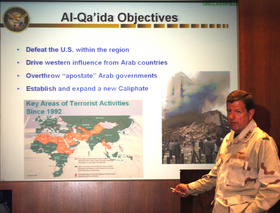|
MACDILL AIR FORCE BASE, Fla., April 25, 2006 – A top admiral at U.S. Central Command challenged a group of civilian leaders visiting here yesterday to use the experience to learn all they can about ongoing military operations so they can act on that knowledge when they return home as better informed citizens.

Vice Adm. David Nichols, deputy commander of U.S. Central Command, describes threats to regional stability in the command's area of responsibility to participants in the 71st Joint Civilian Orientation Conference during their visit to the CENTCOM headquarters at MacDill Air Force Base, Fla. Photo by Petty Officer 2nd Class Larry Chambers, USCG
(Click photo for screen-resolution image);high-resolution image available. |
|
Navy Vice Adm. David C. Nichols Jr., deputy commander of U.S. Central Command, spoke to participants in the 71st Joint Civilian Orientation Conference before they left CENTCOM headquarters on a weeklong trip that will take them to areas in the Middle East to observe ongoing military operations and meet U.S. servicemembers carrying them out.
The general recalled the patriotic fervor he witnessed upon returning to the United States after his first post-Sept. 11, 2001, deployment.
"People were trying to figure out how they can help and what they can do, and I told them there were two things they could do," Nichols said. "You can learn as much about this war and what is going on in the Central Command (area of responsibility) and you can participate in the American democratic process."
Nichols urged the JCOC group to take in everything they can as they visit the region during an experience that, he said, "hopefully will better arm you to go out there and ... participate in the political process that makes this country the great country that it is."
Participants in the program -- business, civic, community and academic leaders from around the country -- got the first glimpse at what's ahead for them this week with a "big picture" look at CENTCOM and its mission.
Marine Col. Dave Greco, deputy director for the command's Coalition Coordination Center, described the scope of CENTCOM's area of responsibility and the challenges it entails.
With 663 million people in 27 countries who speak seven major languages and represent 12 major religious and 18 major ethnic groups, CENTCOM's area of responsibility is as diverse as it is strategic, he told the group.
Nichols outlined the command's broad missions: to defeat adversaries in the region, promote regional stability, support U.S. friends and allies, and protect U.S. national interests.
But with al Qaeda and other extremists groups using terror to destabilize the region, the lion's share of the U.S. effort is directed at the first two of those missions, he said. "We'd love to flip this list, but we're just not there yet," he said.
The United States has 198,000 servicemembers and almost 30,000 civilians deployed throughout the CENTCOM region, in addition to 34,500 coalition members, Greco said. Along with Iraqi and Afghan security forces that continue to gain in numbers and capability, that brings the coalition force total in the region to almost half a million, he said.
The 64 nations represented at CENTCOM headquarters bring different capabilities to the effort, he noted. Some coalition partners provide troops on the grounds. Others provide humanitarian, logistics or financial support, and still others assist with overflight and basing rights.
"We're all here on different mandates," Greco said of the coalition partners, comparing them to players who hold different positions in a soccer game. "Everyone contributes what is appropriate to their country, and each contribution and the result of the collaboration strengthens the entire operation," he said.
These forces face an unconventional enemy that applies what Nichols called "fourth-generation warfare" concepts that focus on diminishing a nation's ability to exercise its own sovereignty.
He pointed to Iraq as an example, noting that former Saddam Hussein-regime loyalists, Baathist elements and rejectionists who have no place in the new Iraq are inciting sectarian violence as a way to disrupt democratic progress. The U.S. goal in Iraq "is to help the Iraqis create a government with as much political equity as possible for as many Iraqis as possible," Nichols told the group.
But in Iraq, as elsewhere in the CENTCOM operating area, a military response alone isn't enough to ensure long-term stability, he said.
"Our national security can't be guaranteed by military means alone," he said. "It involves a whole lot of other activity and an entire interagency process. And it has to be knitted together in a way that's integrated, not just coordinated."
The JCOC participants will get a firsthand look at some of that integration this week as they visit the region. The visit is the first for a JCOC group to the Middle East since the Defense Department started the program in 1948 to help educate civilian "movers and shakers" about the military.
Marine Brig. Gen. Anthony Jackson, deputy commander of U.S. Marine Forces Central Command, encouraged the group to meet as many of the young men and women in uniform as possible during their visit. They're "not some steely-eyed John Wayne" types, but rather, young patriots serving their country, he said.
"They are the heart and soul of our nation," he said. "They are giving their all to a very worthy cause, ... and they're dedicated to the task they do. They're the absolutely gem of this nation."
|